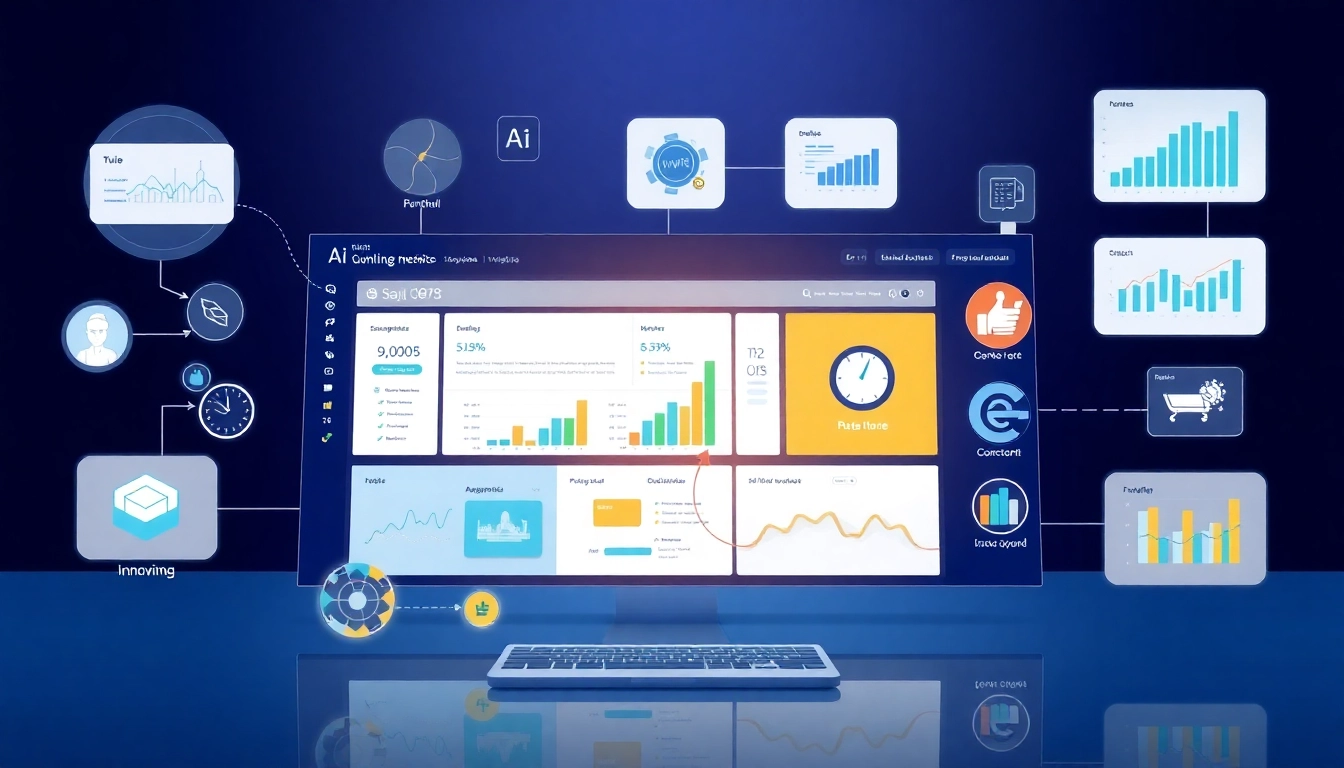Understanding AI Marketing Tools
What Are AI Marketing Tools?
AI marketing tools are innovative software solutions that harness artificial intelligence technologies to assist marketers in executing campaigns, analyzing data, and enhancing various marketing activities. These tools automate routine tasks, allow for more personalized customer interactions, improve campaign targeting, and provide valuable insights based on data analysis. From chatbots that handle customer service inquiries to sophisticated analytics platforms that predict consumer behavior, these tools have become integral to modern marketing strategies.
The Evolution of AI in Marketing
The journey of AI in marketing began as early as the 1950s but gained significant traction in the 21st century with advancements in machine learning and data analytics. In the last decade, the digital landscape has shifted dramatically; marketers now have access to vast amounts of data generated from consumer interactions across multiple channels. AI technologies such as natural language processing and machine learning algorithms have evolved to process and analyze this data, enabling marketers to create more targeted and effective campaigns.
Key Benefits of Implementing AI Tools
- Improved Efficiency: Automating repetitive tasks allows marketing teams to focus on strategic planning and creativity.
- Enhanced Customer Insights: AI tools can analyze data to segment audiences and predict customer behavior, leading to more tailored marketing efforts.
- Increased Personalization: By utilizing AI, marketers can create personalized experiences for customers, improving engagement and conversion rates.
- Real-time Data Analysis: AI provides immediate insights, allowing marketers to adapt strategies in response to market changes.
- Cost Savings: By streamlining processes, businesses can reduce operational costs associated with their marketing efforts.
Top AI Marketing Tools to Consider
Comprehensive Reviews of Leading Tools
The market is saturated with AI marketing tools, each designed to address specific needs within the marketing ecosystem. Here are some prominent examples:
- HubSpot: This all-in-one inbound marketing and sales platform integrates AI to automate and optimize marketing campaigns. Its CRM capabilities include lead tracking and email marketing automation, which are essential for inbound marketing strategies.
- Jasper: A powerful content generation tool, Jasper helps marketers create high-quality content tailored to specific audiences. Its AI writing assistant can produce blog posts, social media updates, and marketing copy.
- Surfer SEO: This tool combines content creation with SEO optimization, allowing marketers to analyze SERP data and optimize written content for search engines effectively.
- Canva: Known for its design capabilities, Canva has incorporated AI features that suggest design elements based on user input and previous designs, making it easier for marketers to create visually appealing content.
- Zapier: This automation tool integrates with various apps, allowing marketers to automate workflows and improve efficiency without coding skills.
AI Tools for Content Creation and Management
Content is a cornerstone of digital marketing, and several AI tools facilitate the creation, management, and optimization of content:
- Copy.ai: This platform generates marketing copy and social media posts, helping teams draft engaging content quickly.
- Grammarly: While primarily known as a grammar-checking tool, Grammarly uses AI to suggest style and tone adjustments based on the context of the writing, which is vital for maintaining brand voice.
- Frase: This AI content creation platform helps marketers generate content briefs and outlines by analyzing existing online content and identifying key themes.
Social Media AI Solutions
Social media marketing is increasingly driven by AI. Here are some noteworthy tools:
- Hootsuite: With its AI capabilities, Hootsuite optimizes social media scheduling by analyzing the best times to post based on audience engagement patterns.
- Buffer: This social media management tool uses AI to suggest post formats and timings, driving better engagement for users’ accounts.
- FeedHive: This tool specializes in content recycling, enabling marketers to repurpose existing content effectively while maintaining relevance on social media.
Integrating AI Marketing Tools into Your Strategy
Assessing Your Business Needs
Before adopting AI marketing tools, it is crucial to assess your business needs carefully. Understand the specific challenges your marketing team faces—be it campaign management, content creation, customer segmentation, or analytics. This clarity will inform your decision-making process and ensure the tools you select align with your goals.
Steps for Successful Implementation
- Define Objectives: Clearly state what you aim to achieve by implementing AI tools, whether it be enhancing efficiency, improving customer interactions, or gaining deeper insights.
- Choose the Right Tools: Based on your objectives, carefully evaluate and select the AI tools that best fit your strategic needs.
- Training and Onboarding: Provide comprehensive training for your team to ensure they feel comfortable using the new tools and understand their functionality.
- Monitor Performance: After implementation, continuously monitor the performance of the tools to gauge their effectiveness and make adjustments where necessary.
- Collect Feedback: Encourage user feedback from your team about their experiences with the tools to identify areas for improvement and address any challenges.
Case Studies: Successful Integration
Several brands have successfully integrated AI marketing tools into their strategies. For instance, Sephora employs chatbots powered by AI to enhance customer service, helping users with makeup advice and product suggestions, thereby improving customer satisfaction and driving sales. Another example is Netflix, which uses AI algorithms to recommend shows based on user viewing habits—successfully increasing viewer engagement and retention.
Best Practices for Using AI Marketing Tools
Common Pitfalls to Avoid
As with any technology, there are pitfalls to be aware of when implementing AI marketing tools:
- Neglecting Data Quality: AI is only as good as the data it uses. Ensure that you have high-quality, clean data for the AI tools to analyze and utilize.
- Over-Automation: While automation can enhance efficiency, too much reliance on AI can depersonalize customer interactions. Maintain a balance between automation and human engagement.
- Ignoring Training: Failure to train your staff can hinder the tool’s effectiveness. Investing in training ensures that your team is equipped to maximize the tools’ potential.
Maximizing ROI with AI Efficiency
Maximizing your return on investment (ROI) with AI tools requires ongoing evaluation and optimization of your marketing strategies. Utilize analytics to track performance metrics, such as engagement rates, conversion rates, and overall campaign effectiveness. Regular reviews enable you to adjust strategies in real-time, ensuring that your marketing efforts remain aligned with business objectives and market trends.
Staying Ahead of Trends in AI Marketing
The landscape of AI in marketing is rapidly evolving. To stay ahead, marketers should continuously educate themselves on emerging trends and technologies. Subscribe to industry journals, attend webinars and conferences, and engage with professional networks to remain informed on the latest advancements in AI marketing. Adapting to these trends proactively can offer a competitive edge, allowing brands to leverage the most effective tools available.
The Future of AI in Marketing
Emerging Technologies and Innovations
The future of AI in marketing will likely be shaped by advancements in machine learning algorithms, natural language processing, and data privacy technologies. Innovations like voice search optimization, AI-powered customer experience platforms, and predictive analytics will further enhance marketers’ capabilities. Additionally, the integration of augmented reality (AR) and virtual reality (VR) with AI could create immersive customer experiences, fundamentally changing how brands interact with consumers.
Preparing for a Data-Driven Future
As data continues to grow in significance, marketers must prepare for a data-driven future. This involves understanding how to collect, analyze, and utilize data effectively. Implementing robust data governance frameworks to protect consumer privacy will be critical in ensuring that marketing practices remain ethical and compliant with regulations. As AI’s computing power increases, so too will its ability to derive insights from larger datasets, transforming decision-making processes across marketing functions.
Conclusion: The Path Forward for Marketers
AI marketing tools represent a significant opportunity for marketers to enhance their strategies and engage customers more effectively. By understanding how these tools work, selecting the right solutions, and avoiding common pitfalls, brands can unlock the full potential of AI in their marketing efforts. As the technology evolves, businesses that embrace AI will likely find themselves at the forefront of innovation and success in an increasingly competitive landscape. For those looking to explore AI marketing tools, the journey begins with understanding their value and implementation strategies.



